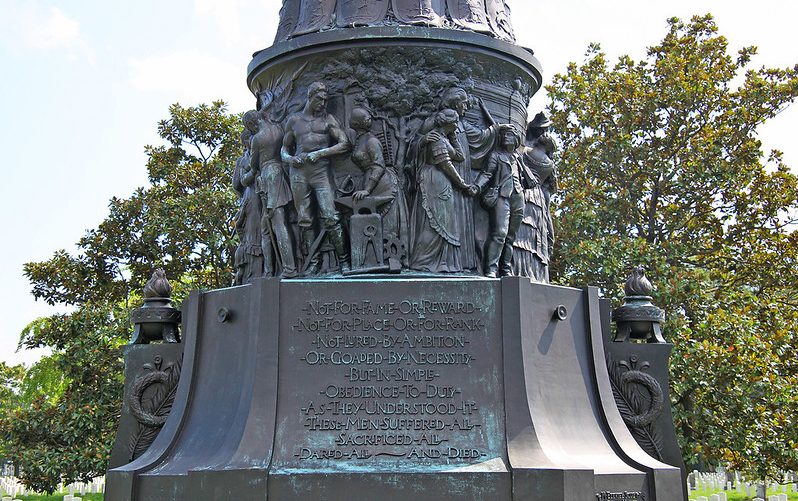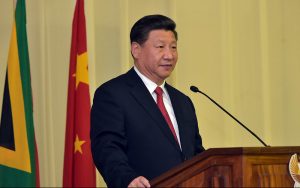The U.S. Civil War began on 12 April 1861 and would end four years and fourteen days later on 26 April 1865. While exact numbers of the ceased are unknown, it is estimated that some 750,000 Americans died in the conflict, some 360,000 for the United States, and 260,000 died on the Confederate side. The conflict forever changed the course of American history and was a monumental development from a social, political, legal, and economic perspective.
However, in the decades after the Civil War, partly due to the promulgation of Lost Cause myths, a more positive view of the Confederacy and their military has evolved.
Quite seriously, there are many Confederates buried at Arlington National Cemetery. According to the official tour company of Arlington National Cemetery, section 16 of the cemetery “holds the remains of 482 confederate soldiers…[including] enlisted men, officers, wives, civilians, and the unknown”. The section had been created in 1900, following the end of the Spanish-American War in 1898, a war in which many “former Union and Confederate soldiers together against a common enemy and eased tensions between the North and the South”.
When the Confederate section was created, President William McKinley stated, “The Union is once more the common altar of our love and loyalty, our devotion and sacrifice…Every soldier’s grave made during our unfortunate Civil War is a tribute to American valor…in the spirit of fraternity we should share with you in the care of the graves of the Confederate soldiers”.
While this may be a controversial view, I argue that these Americans who fought for the Confederacy should be disinterred and removed from Arlington for multiple reasons.
The Arlington National Cemetery’s official eligibility fact sheet states that “…most veterans who have at least one day of active service (other than for training) and an honorable discharge are eligible for above-ground inurnment” while veterans who died in full-time active duty service, are retired from active duty service, received one of an assortment of medals, or were Prisoners of war (POWs) are eligible for in-ground burial.
The one keyword that keeps recurring for either an in-ground burial or inurnment, however, is honorable.
Burial and inurnment at Arlington National Cemetery are one of the highest honors the U.S. Armed Forces can grant to a deceased soldier. It is a sign of a grateful nation and ultimate respect for that soldier’s sacrifice. They have given their lives or served in their nation’s military for the safeguarding of Democratic ideals, in defense of a greater and just belief, and for the preservation of the U.S. Constitution. They have shown courage, gallantry, and fidelity to their country and are honored accordingly in the best way possible by their nation.
The Confederates, on the other hand, fought in direct contradiction of the U.S. Constitution and the legal rule of law in the United States. They explicitly fought to preserve slavery and took up arms against their own countrymen when they validly and fairly elected Abraham Lincoln, the anti-slavery candidate, and committed perhaps the greatest crime an American can ever commit: treason.
Not only this, but a key distinction here is that many of these soldiers chose to go to the Confederate States of America. They knowingly chose to join the militaries of the state of their birth and defend an institution that was morally, religiously, and ethically repugnant.
While it would not have been easy to join the U.S. Army, Navy, or Marines, the honorable or right choice never is easy. It is often hard and difficult and requires a tremendous amount of moral courage and fortitude. That is why those Southerners who chose to join the United States and sided with the U.S. during the Civil War should instead be those most honored by their nation, given they, when faced with arguably the most difficult choice in their lives, chose to side with the morally and ethically correct nation.
Slavery is furthermore nowhere near an honorable military or political goal. It is an abhorrent one, one that was abhorrent even at the time of the founding of the United States and to many of the Founding Fathers. As well, there is the longstanding myth that many Confederates in the military did not own slaves. This is untrue and actually has been found by both historical studies and contemporary evidence to be the exact opposite with “volunteers in 1861 [being] 42 percent more likely [than the general population] to own slaves themselves or to live with family members who owned slaves…Confederate volunteers actually owned more slaves than the general population”.
In short, when we think of Arlington National Cemetery, we associate it as being a place of reverence with those interred to be deserving of that honor. Interring Confederates within the grounds is a sign of disrespect to those who served their country and gave their lives honorably for it.
Sources Arlington National Cemetery: Confederate Memorial, https://www.arlingtoncemetery.mil/Explore/Monuments-and-Memorials/Confederate-Memorial Arlington National Cemetery: Eligibility for Burial and Inurnment at Arlington National Cemetery Fact Sheet, https://www.arlingtoncemetery.mil/Portals/0/ANC%20Eligibility%20Fact%20Sheet%2004-03-2019.pdf Arlington National Cemetery Tours: https://www.arlingtontours.com/civil-war-confederate-soldiers-arlington BBC News (2012): Who, What, Why: How many soldiers died in the US Civil War?, https://www.bbc.com/news/magazine-17604991








Agreed and well stated
Those in the confederate army made a choice to fight against the United States and that alone should make them ineligible to be honorably recognized for serving